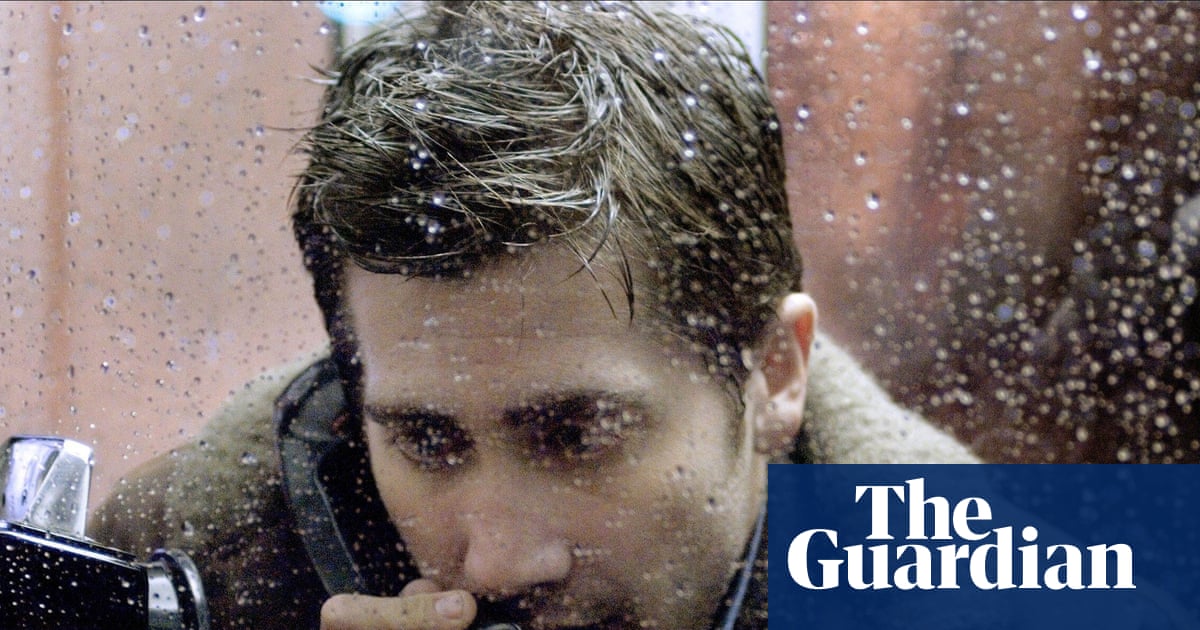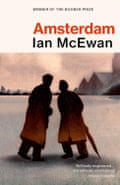
10 Amsterdam (1998)
Two old friends, composer Clive Linley and newspaper editor Vernon Halliday, meet at the funeral of charismatic Molly Lane, a former lover of both men (along with many other successful men of the time). This sharp 90s satire – the Conservatives have been in power for 17 years – has the misfortune of being McEwan’s only novel to win the Booker prize in his 50-year career, despite being widely considered one of his slightest. But it fizzes along like the champagne that is part of the euthanasia pact hatched by the two men in a plot that even the author conceded was “rather improbable”. New York Times critic Michiko Kakutani was right when she concluded that it was testament to the author’s skill that he had managed “to toss off a minor entertainment with such authority and aplomb” to win the gong he had so long deserved.

9 First Love, Last Rites (1975)
A pickled penis, cat-roasting, incest, cross-dressing and child abuse are just some of the unsettling fare served up in McEwan’s first short story collection, published when he was just 27. The literary world was shocked and enthralled. “Even the positive reviews were scandalised,” McEwan wrote later. “What monster had come among us?” The monster was here to stay.
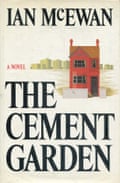
8 The Cement Garden (1978)
Everyone remembers the first time they read The Cement Garden. “I did not kill my father, but I sometimes felt I had helped him on his way,” begins the chillingly impassive voice of the teenage narrator Jack. Four children bury their dead mother in the cellar and the oldest siblings end up having sex. McEwan’s first novel is as hard and smooth as the concrete in which both parents fetch up, and it left a dark imprint on the psyche of a generation of teenagers. He didn’t earn his nickname Ian Macabre for nothing.
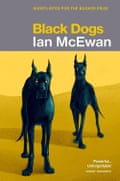
7 Black Dogs (1992)
Bernard and June Tremaine, married but unable to live together, represent “the twin poles” of rationalism and spiritualism at the heart of this novel of ideas. Set against the fall of the Berlin Wall, McEwan’s fifth novel is considered a “neglected gem” by critics. It is also, apparently, one of the author’s favourites. The eponymous slavering black dogs may be metaphors for man’s capacity for evil, but in the novel’s climax they are terrifyingly real. “They will return to haunt us, somewhere in Europe, in another time”: the final line seems depressingly prophetic today.
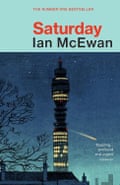
6 Saturday (2005)
For those early McEwan devotees bemoaning that he had gone over to the light side, Saturday was the point of no return. Set on 15 February 2003, when 2 million people took to the streets of London to protest against the invasion of Iraq, the novel follows a day in the – very comfortable – life of neurosurgeon Henry Perowne: early-morning lovemaking with his wife; a game of squash; a visit to his elderly mother; and a lovingly prepared bouillabaisse for supper. John Banville declared it a “dismayingly bad book”, and the ending might be preposterous (Matthew Arnold saves the day!), but the novel hums with the same technical mastery and polish as the silver Mercedes in which Perowne drives around Fitzrovia. The prince of darkness ascended to “England’s national author”.

5 Nutshell (2016)
McEwan’s 14th novel is a rewriting of Hamlet told by a foetus in utero – but don’t let that put you off. Reflections on mortality, the climate emergency and neuroscience are all squeezed into 200 pages. “Not everyone knows what it is to have your father’s rival’s penis inches from your nose,” gives a whole new perspective on the Oedipal undertones of Shakespeare’s original. McEwan once compared comic novels to being pinned down and tickled. Here he is on ticklish form: funny, weird and deadly serious.
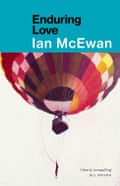
4 Enduring Love (1997)
The balloon accident at the beginning of Enduring Love cemented McEwan’s reputation as the master of the gripping opening set piece. A picnic on a sunny afternoon. A nice bottle of wine. A cry for help. Five men hold on to the ropes of a hot-air balloon to try to save a 10-year-old boy in the basket. One by one they let go. “Hanging a few feet above the Chilterns escarpment, our crew enacted morality’s ancient, irresolvable dilemma: us, or me.” The reader remains suspended in a state of high anxiety until the last page of this story of a stalker’s obsession. “I wanted to write a book in praise of rationality, which gets a poor showing in literature,” McEwan told Radio 4’s Bookclub.

3 On Chesil Beach (2007)
“They were young, educated, and both virgins on this, their wedding night, and they lived in a time when conversation about sexual difficulties was plainly impossible,” begins this slim, elegant novel. It is 1962, the year before “sexual intercourse began”, as Philip Larkin has it, but begin it must for the newlywed art graduate Edward Mayhew and violinist Florence Ponting. It doesn’t go well. Each misinterprets the other’s moves in a way that would be comic were it not so sad. McEwan dismantles this nascent marriage with the same forensic attention he once dismembered a corpse in The Innocent.
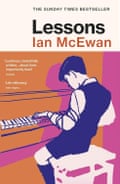
2 Lessons (2022)
Spanning a 70-year stretch from the postwar period to the present day, Lessons is McEwan’s longest and also most autobiographical work, “a novel of the backwards look”, as the author put it. The novel interweaves the story of Roland Baines from his army childhood in Libya to boarding school in Suffolk (both also apply to the author), unsatisfactory jobs, love affairs and marriages, with global events from the Suez and Cuban crises up to Brexit and the pandemic. The unsettling opening section about an intense affair between 14-year-old Roland and a young piano teacher is vintage McEwan. Lessons charts a generation’s decline from youthful optimism to political disillusionment and despair. A friend of McEwan’s wrote to say it had the feel of a last novel. Fortunately, they were wrong: a new book, What We Can Know, set in a future UK partly submerged by rising tides, will be published this month.

1 Atonement (2001)
A 1930s country-house romance, a bravura account of the British retreat from Dunkirk in 1940 and a metafictional coda that made some readers want to start the novel from the beginning and others hurl it at the wall – this is McEwan at the height of his powers and determined to show what he could do with them. All his favourite themes are here: loss of innocence, morality, the possibility of absolution and the workings of fiction itself. His old friend Martin Amis described the first 200 pages of Atonement as McEwan’s greatest achievement. John Updike called it “a beautiful and majestic fictional panorama”. It might not have won the Booker, but its success (and the starry film adaptation) made McEwan a household name. Nearly 25 years after it was published, Atonement remains one of the finest novels of this century.

 3 months ago
61
3 months ago
61







